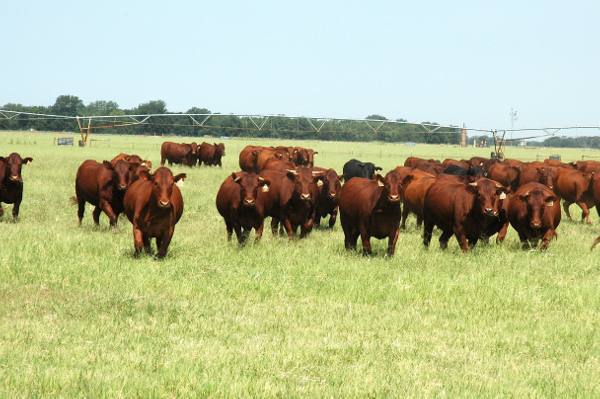February 27, 2012

Helping a beef producer become more profitable and identifying methods to make an operation more efficient are just two goals associated with a program offered by the Texas AgriLife Extension Service, according to organizers.
The Beef Partnership in Extension Program, also known as Beef PEP, began in 1996 to conduct applied research in cow-calf production management and teaches producers the benefits of implementing improved management practices.
“Our goal with the Beef PEP program is to improve profitability and lower the cost of production,” said Dr. Tom Hairgrove, AgriLife Extension animal health specialist and program coordinator. “A producer in this program gets a complete examination of his operation and comes away with several methods to help improve the bottom line.”
AgriLife Extension specialists assist program participants with a variety of expertise. Specialists in the areas of forage, economics and animal health work with different producers in Texas. Representatives from Texas A&M University’s College of Veterinary Medicine also assist in the program, while Pfizer Animal Health continues to sponsor activities with products and consultation.
AgriLife Extension specialists have one-on-one meetings with the producers, evaluating all aspects of an operation from finances, forage systems, and herd selection and breeding programs. From those meetings, a broad-view plan is developed for the rancher and specialists work in consultation for several months during the year.
“The bottom line of the Beef PEP project is to benefit Texas beef cow-calf producers,” said Dr. Steve Wikse, who started the program and is now a retired professor of veterinary medicine at Texas A&M. “It helps them have sustainable operations. Even greater, the program helps build on the economic impact of Texas beef cattle operations.”
The first Beef PEP program had six study herds, Wikse said, successfully adding more than 100 pounds of weight gain on marketed calves.
“We gave each of those ranches scores on a scale of one to five,” Wikse said. “During this initial start of the program, drought conditions prevailed, but 80 percent of added gain came as a result of new methods implemented upon the advice of our consultation.”
In 2011, of the four herds involved in the Beef PEP program, the average herd size is 200 head. One of the first evaluations was finances of the herds, said Dr. Stan Bevers, AgriLife Extension economist in Vernon.
“The main thing producers need to realize is how important records are,” Bevers said. “It can be as simple as pen and paper, or putting financial information into an Excel spreadsheet.”
Bevers runs the data collected from the herds through the Standardized Performance Analysis software system. It generates specific production data showing a producer how much each cow is generating in sales and profit.
“Once you go through the records and start looking through each category, you come away seeing that costs are always higher than what you thought they were,” he said.
Finances
Bevers said an easy way to see how much costs are affecting a rancher’s bottom line is to take the Schedule F filed with a federal income tax return, taking expenses and divide that by the number of cows you have.
“Beef PEP allows us to come in and take a real-life situation in a county and bring in a professional with expertise related to specific areas, such as forage production,” said Mark Currie, AgriLife Extension agent in Polk County. “The program is also advantageous to us because we can take what we learn from it and apply it to other programs within Extension.”
Dr. Glenn Rogers, Pfizer senior manager for beef veterinary operations, said the program benefits everyone involved.
“We consider Beef PEP a program that can have a big impact on livestock health and the state of Texas,” he said. “Instead of focusing on just one disease, it allows us to showcase our whole portfolio of (livestock) health products.”
Pfizer has been a Beef PEP sponsor for more than 10 years and has been an active participant in the study herds, Hairgrove said.
For more information about the program, contact Hairgrove at 979-458-3216 or email [email protected].
You May Also Like




